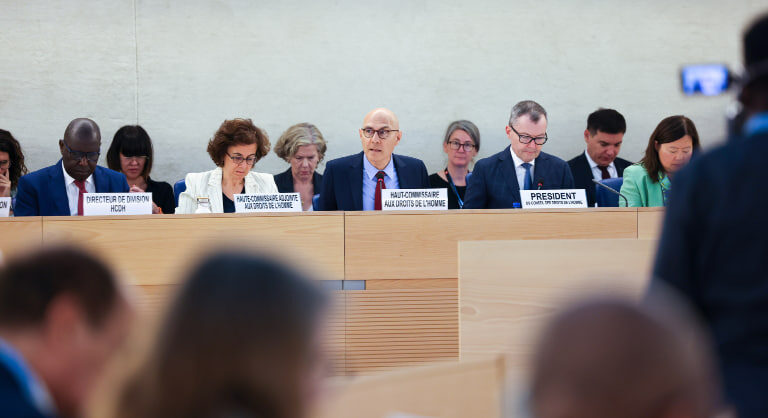The European Parliament passed a resolution on the establishment of a tribunal for the crime of aggression against Ukraine.
Resolution affirming the determination of EU member states to seek the prosecution of criminals in the highest levels of the Russian military and government. Similar statements were previously made by governments, as well as the Council of Europe and the OSCE, that ARC described already.
The UN General Assembly is anticipated to consider the resolution on the establishment of the tribunal in the near future [2]. And despite the fact that the European Parliament’s resolution is political, it is so extensive and multifaceted that it should be evaluated from the perspective of all those to whom it is addressed: Ukraine, all Europe, the Russian government, and the world community as a whole. What did each of these audiences hear from the European Parliament? Oleksii Plotnikov, expert in international judiciary, researched this issue.
Message to Putin: you will not escape!
The core of what was communicated to the highest political and military leadership of Russia can be summed up in a single phrase: “the tribunal is inevitable.” The determination of the EU to seek the prosecution of individuals guilty of aggression is unaffected by money or intimidation.
The resolution asserts that Russia has been conducting an unlawful, unprovoked, and unjustified war of aggression against Ukraine since 2014, and that the major invasion of 2022 is merely a continuation of this conflict.
Thousands of peaceful Ukrainians perished as a result of the actions of the aggressor, while others were subjected to intimidation, torture, and violence, kidnapped or forcibly deported to the Russian Federation, and numerous infrastructure facilities were destroyed, demonstrating the Russian forces’ complete disregard for international humanitarian law.
This qualifies the Russian Federation as a state sponsor of terrorism and a state that employs terrorist means. According to UN General Assembly Resolution 3314 [3], such activities constitute aggression, which is a violation of the UN Charter [4] and a crime under the Rome Statute of the International Criminal Court [5]. Additionally, the European deputies reminded that in 1946, the Nuremberg Tribunal deemed aggression to be the most severe international crime.
From the perspective of the European MPs, it appears that the Russian leadership, in attempting to “repeat” the old Soviet victory, selected the wrong side and will suffer the same fate as the Nazi German leadership.
The European Parliament, condemning the aggression, demanded in the resolution that Russia immediately cease operations in Ukraine and withdraw all troops and military equipment from the entire internationally recognized territory of Ukraine.
It is unlikely that the resolution’s authors anticipated a favorable response from the aggressor, given that it also condemns the Russian practice of blocking any acts at the United Nations that could lead to bringing the Russian Federation and individual criminals to justice.
This formula serves as a reminder of the internationally recognized borders of Ukraine; the call for the withdrawal of forces applies not just to the lands occupied in 2022, but also to the portions of Donetsk, Lugansk, and Crimea that have been occupied since 2014.
According to MEPs, the aggression committed necessitates the joint efforts of the international community and Ukraine to establish a special international tribunal to penalize the aggression committed by the top political and military leadership of the Russian Federation and its allies. This tribunal should have the authority to punish not only Vladimir Putin and the Russian leadership, but also Alexander Lukashenka and the political and military leadership of Belarus, a state which provided its territory to support aggressive war.
This is not the first time Russian and Belarusian leaders have been named as war criminals in an international instrument. Presumably, in other situations such statements could be construed regarding the presumption of innocence, but in this instance, the crime is so extensive and the criminals’ guilt so obvious that the European Parliament believes it is permissible to inform the criminals directly that an international tribunal is inevitable.
Message to Ukraine: justice will be restored
The Resolution contains two semantic blocks addressed to Ukraine, relating to cooperation in the establishment of a special tribunal and the reparations mechanism. Although Ukraine is not a party to the Rome Statute, it cooperates with the International Criminal Court to investigate crimes against humanity and war crimes since 2014. Due to jurisdictional restrictions, the International Criminal Court cannot adjudge on the aggression against Ukraine, hence it is important to discover alternative methods of responsibility for this crime.
The Resolution highlights the significance of establishing a special tribunal for the administration of justice and the restoration of justice for the Ukrainian people. The European Union should collaborate with Ukraine and assist Ukrainian authorities and foreign organizations in collecting evidence for the future tribunal as part of its preparation work. This activity should facilitate the process of collecting reparations for the benefit of the Ukraine and a peaceful settlement.
By resolution, the European Parliament endorsed the UN General Assembly’s [6] recommendation to establish a register of damage caused by aggression against Ukraine and its nationals and legal persons. Unlike the resolution of the United Nations General Assembly, the text of the European Parliament mentions the need to compensate for long-term and extensive damage to the natural environment and climate, which is particularly pertinent for Crimea, where the occupiers’ policies have led to the destruction of entire ecosystems, and ARC has repeatedly written about it.
The resolution further highlights the need to recover compensation not only from the Russian Federation, but also from its allies in the attack against Ukraine.
Thus, the European resolution evaluates comprehensively both the nature of the damage caused to Ukraine and the scope of those responsible who will be obliged to compensate for this damage.
It is particularly vital that the paper addresses not just injury to the state and to specific legal entities and persons, but also harm to the Ukrainian people as a whole. In view of the Ukrainian claim of genocide as a separate international crime, the damages caused by it require separate compensation.
Message to Europeans: no more business as usual
The resolution establishes the course of European Union strategy in response to Russian aggression. It states that this aggression constitutes a blatant and flagrant violation of the fundamental principles of the world and European order, necessitating the establishment of a special tribunal to investigate and punish the crime of aggression, as well as a mechanism in Europe for the use of frozen Russian assets to compensate for it.
In order to overcome these effects, according to the European deputies, it will be necessary for all EU bodies to work together to gain political support for the establishment of a special tribunal for the crime of aggression against Ukraine at the United Nations and on other international platforms, such as the Council of Europe, the OSCE, and the Big Seven.
To gain support for the special tribunal, European diplomacy should create a coordinated communication strategy. The EU as a whole should have a common approach on the crime of aggression in accordance with the Rome Statute. Separately stated in the resolution is a view regarding the necessity of establishing a temporary prosecutor’s office for investigation and prosecution at the future special tribunal.
By its Resolution, the European Parliament invited all EU member states, as well as its partners and allies, to participate in a discussion regarding the legal feasibility of utilizing Russian sovereign assets to make reparations to Ukraine. As indicated in the Resolution, such assets may lose their sovereign immunity due to the severity of the aggressor’s violations.
According to European deputies, the establishment of a special tribunal should send a clear message to the Russian leadership and society regarding the inevitability of punishment for the crime of aggression, while the Russian elites and Russia’s allies must realize that “business as usual” will not resume. Obviously, this also applies to supporters of Russia within the EU.
Message to the world: a crime against peace must be punished.
The Resolution’s conditional semantic block, addressed to the international community, can be summed up as follows: “we must enforce United Nations to achieve justice”. The text underscores the obvious: Russia’s aggression against Ukraine is the most outrageous act of aggression since 1945, requiring a response on all levels.
And while the UN General Assembly may acknowledge the breach of the Organization’s fundamental principles as an political decision, this is not enough response. The UN Security Council is paralyzed over the situation in Ukraine owing to Russia’s ability to veto any substantive action, thus those responsible must be prosecuted without a decision of the Council, Resolution stresses.
The European deputies suggested relying on the 1950 United Nations General Assembly Resolution 377 (V) “Uniting for Peace” [7]. According to it, “if the Security Council, because of lack of unanimity of the permanent members, fails to exercise its primary responsibility for the maintenance of international peace and security in any case where there appears to be a threat to the peace, breach of the peace, or act of aggression, the General Assembly shall consider the matter immediately with a view to making appropriate recommendations to Members for collective measures…to maintain or restore international peace and security”.
Such collective measures are precisely what the European Parliament offers the world. The threat of deploying weapons of mass destruction makes aggression not only a danger to Ukraine, but to the entire planet. According to the ruling of the International Court of Justice of the United Nations in the “Barcelona Traction” case [8], violation of the prohibition on aggression constitutes a breach of obligation owed not only to the victim-state, but also to the international community as a whole.
Russian aggression is an undeniable violation of the United Nations Charter and the pillars of a law-based international order, which cannot go unpunished. Therefore, the EU, Ukraine, and the international community as a whole should seek the establishment of a tribunal to prosecute for aggression. The path through the United Nations would be ideal, but not the only viable option.
The Resolution recognizes that the International Criminal Court lacks jurisdiction to persecute for the crime of Russian aggression against Ukraine creating a gap in the existing institutional structure of international criminal justice, necessitating the establishment of a separate special tribunal governed by the same principles and standards as the International Criminal Court. The choice to establish such a court should be made by the international community as a whole.
After Resolution: The Way Forward
The Resolution of the European Parliament uses broad terms to describe the concept of a tribunal for the crime of aggression against Ukraine. The attitude of Great Britain, which is not a member of the EU but actively supports the establishment of the tribunal, allows for the formation of a more definite concept. The British Foreign Office said on January, 2023 the day when the European Parliament Resolution was adopted, that it would play a leading role in a group of like-minded states working on the establishment of the tribunal [9].
This position holds that the tribunal should be hybrid, i.e., constituted under Ukrainian law but with foreign elements. Ultimately, as the former prosecutor in the case against Slobodan Milosevic, British attorney Geoffrey Nice KC, the lead prosecutor at the trial of Slobodan Milošević, said: “I firmly believe that whatever is done in terms of accountability should be done by Ukrainians, in Ukraine and in Ukrainian and Russian languages– not English. Not by internationals, they can advise, but don’t let them run it.”
In fact, regardless of the ultimate shape that the international tribunal will take, the condemnation of aggression ought to be principally the responsibility of Ukraine.
- https://www.europarl.europa.eu/doceo/document/TA-9-2023-0015_EN.pdf
- https://www.slovoidilo.ua/2023/01/13/novyna/bezpeka/specztrybunal-shhodo-ahresiyi-rf-ukrayina-anonsuvala-holosuvannya-oon
- http://hrlibrary.umn.edu/instree/GAres3314.html
- https://unic.un.org/aroundworld/unics/common/documents/publications/uncharter/UN%20Charter_Ukrainian.pdf
- https://zakon.rada.gov.ua/laws/show/995_588#Text
- https://digitallibrary.un.org/record/3994052?ln=en
- http://www.un-documents.net/a5r377.htm
- https://www.icj-cij.org/en/case/50/judgments
- https://www.gov.uk/government/news/ukraine-uk-joins-core-group-dedicated-to-achieving-accountability-for-russias-aggression-against-ukraine
- https://www.theguardian.com/politics/2023/jan/20/uk-offers-qualified-backing-special-tribunal-to-prosecute-russia-leaders-putin-ukraine







